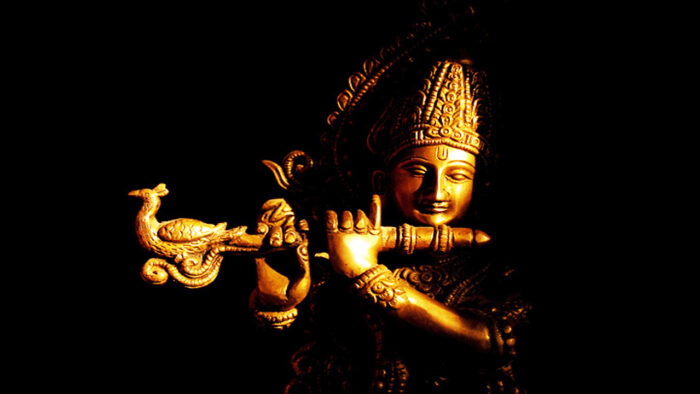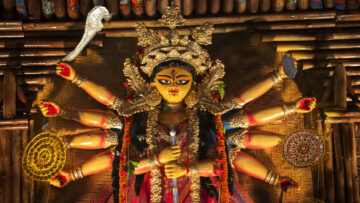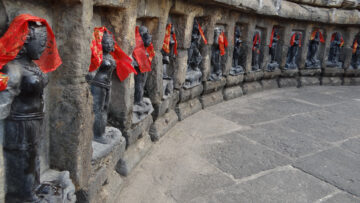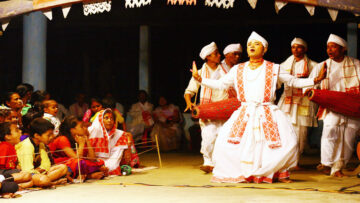Hindutva, rooted in Sanatana Dharma which later came to be addressed as Hinduism, is considered one of the widely followed and comprehensive religions globally. However, it faced a challenging period in history with the rise of Buddhism and Jainism, spreading roots across the country. The sinking state of Hinduism fervently demanded rescue and re-establishment which was accomplished by the great Avatara Purusha His Holiness Jagatguru Shri Adi Shankaracharya Bhagavatpada. The sage’s exclusive and extensive service and contribution towards the upliftment of the honour of Hinduism paved way for the rise of ‘Shanmata’ or ‘Shanmarga’- the six doctrines/schools of worship. They are Ganapatyam-the worship of Lord Ganapati, Sauram-the worship of Lord Surya, Shaivam-the worship of Lord Shiva, Shaktam-the worship of Goddess Shakti-Parvati, Kaumaram-the worship of Lord Subrahmanya and Vaishnavam-the worship of Lord Vishnu.
Vaishnavism
Vaishnavism is the Hindu worship Sampradaya which advocates devotion to Lord Vishnu. The origin of the name of the tradition is traced to the word ‘Vishnu’ itself. That ideology which advocates the devotion and worship of Lord Vishnu is called Vaishnavism and those who follow this path are called Vaishnavas or Vaishnavites. They are more precisely addressed as Sri Vaishnavas as the word Sri refers to Goddess Lakshmi Devi who is the eternal consort of Sri Hari. So, it is indicative of the fact that wherever Lord Vishnu is there, Goddess Lakshmi’s presence is naturally found there and vice-versa.
जगत्-Jagat (world) or the material existence as it can be called in other words, undergoes three states or processes namely सृष्टि-Srushti (Creation), स्थिति-Sthiti (Protection) and लय-Laya (Dissolution) yuga after yuga. These three functions are traditionally attributed to the Trimurthis, Lord Brahma, Lord Vishnu and Lord Shiva respectively. But, in the Vaishnava sampradaya, all these three aspects are attributed to the single deity Vishnu Himself. So, according to Vaishnavism, the worship of Hari is complete in and by itself. Vaishnavism advocates devotion and surrender to Vishnu as the Supreme Self- the Paramathma holding Him as the whole & complete abode of all the four Purusharthas- पुरुषार्थ viz. धर्म-अर्थ-काम-मोक्ष: Dharma (virtue), Artha (wealth), Kama (desire) & Moksha (Liberation). Nevertheless, it does not condemn or demean any other God or the worship of any other deity.
The key concept of Vaishnavism is Sharanagati-शरणागति/प्रपत्ति -Prapatti. Devotion to Vishnu should ultimately lead to the complete surrender to the Lord. This is expounded in the Bhagavad Gita by Lord Krishna Himself. In this context, the daily routine of a Vaishnavite is based on the governing texts of the sampradaya like Srimad Bhagavad Gita, Vaishnava Agamas and the devotion filled outpourings of the Alvars. Such a routine is enjoined in a manual called Ahnikam.
The Vaishnava tradition is rich in Stotra literature. The Jitante Stotra, among these is found in the Pancaratra Agama text. This is considered to be a small portion of the Rig Veda mantras and hence considered very high with the esteem of a mantra itself, though being a Stuti/Stava.
The Jitante stotra owes its name to the first shloka or hymn, as it commences with the word Jitante. The earliest commentator on this stotra, Sri Periyavaccan Pillai observes this as a mantra. This stotra is generally observed to be recited at the end of the aradhana ritual of Sri Hari. The manuscript of this work is preserved in the Oriental Research Institute Library, Mysore.
This Jitante stotra is understood to have been recited by the dwellers of Shvetadvipa, the sphere surrounding the Kshirabdhisayana Murthy. Once, Sage Narada visited this place to worship Lord Narayana. On his way he met the sages Ekada, Dvida and Trida, who were doing penance to have the darsan of the Lord. Narada became apprehensive of accomplishing the divine presence. The sages advised Narada that they knew one Jitante stotra that was recited by the inmates of Shvetadvipa and that they would instruct the Jitante to Narada for the realization of Kshirabdhinatha. Narada in turn, mediated on this stotra and instructed the same to Lord Brahma. Brahma, as per the Hindu belief was the instructor of the Puranas to all the sages and he included this Jitante in the Puranas and other literature. Thus, this stotra has come into vogue.
The individual soul, who is desirous of attaining the Supreme Lord, should repent for the sins he has committed and should surrender himself to the Lotus feet of the Lord with utmost faith and devotion. The Sri Vaishnava literature emphasizes these aspects on the part of the individual soul and declares that this is the only means to attain the Supreme Lord. The entire Jitante stotra focuses on this aspect.
The important aspects of devotion and surrender are scattered throughout the stotra. Liberation consists in attaining the abode of the Lord and rendering eternal service to Him. By such a service, the Jiva realizes his true nature that leads to blissful experience. There is no Karma that can bind him anymore.
The Jitante stotras are said to be six in number, each containing many verses distributed throughout them under each category. This article focuses on selective shlokas that expound the key Vaishnava concepts namely भक्ति- devotion and प्रपत्ति/शरणागति-surrender to God. (Selected verses are chosen from the Jitante Stotra published by Visishtadvaita Pracharini Sabha, Chennai, edited with Tamil Translation by Dr. S. Padmanabhan, Head (Retd.), Department of Sanskrit, University of Madras, Chennai).
जितन्ते पुण्डरीकाक्ष नमस्ते विश्वभावन ।
नमस्तेऽस्तु हृषीकेश महापुरुष पूर्वज ॥ १
(Hey Lotus-eyed Lord!! This individual self-Jiva is won by your Supreme Self. You are the Creator of the Universe; the one who has established firm control and won over the senses; the one who is primordial/superior to all.)
एकस्त्वमसि लोकस्य स्रष्टा संहारकस्तथा ।
अध्यक्षश्चानुमन्ता च गुणमायासमावृतः ॥ २
(You are the creator, protector and destroyer of the universe; also only with your permission, the material world exists; so, you are concealed by Maya/ Prakruti comprised of the three qualities namely सत्त्वः-Sattva, रजः-Rajas and तमः-Tamas.)
संसारसारगं घोरमनन्तक्लेश भाजनम् ।
त्वामेव शरणं प्राप्य निस्तरन्ति मनीषिणः ॥ ३
(Those who are stuck in the whims and fancies of transmigration, resort to you as their refuge and thereby cross the ocean of Samsara.)
नैव किंचित् परोक्षं ते प्रत्यक्षोऽसि न कस्यचित् ।
नैव किंचिदसिद्धं ते न च सिद्धोऽसि कस्यचित् ॥ ४
(There is nothing that is beyond your perception; you do not become the object of direct perception to anyone (through the senses or the mind); there is nothing that is impossible for you and it’s impossible to anyone to attain you by one’s own individual effort- without your grace and permission.)
कार्याणां कारणं पूर्वं वचसा वाच्यमुत्तमम् ।
योगानां परमां सिद्धिं परमं ते पदं विदुः ॥ ५
(The wise realise that you are the underlying cause of all the effects in the universe; the supreme sense contained in all the words; the ultimte goal attained by the yogis and the abode of liberaation.)
जितन्ते पुण्डरीकाक्ष पूर्णषाड्गुण्य विग्रह ।
परानन्त परब्रह्मन्नमस्ते परमात्मने ॥ ६
(The Lotus-eyed Vishnu is regaarded as the Supreme, Remote, Eternal Brahmam which is the goal to be achieved/realized by every human being.)
कृशं कृतघ्नं दुष्कर्मकारिणं पापभाजनम् ।
अपराधसहस्राणामाकारं (करं) करुणाकर ॥ ७
कृपया मां केवलया गृहाण मधुराधिप ।
विषयार्णवमग्नं मामुद्धर्तुं त्वमिहार्हसि ॥ ८
(The Lord who is compassion personified is the saviour of those dwelling and involved in sinful activities owing to the fantasies of the material existence; He alone by His divine grace, is the uplifter of all the sinners from the brutal bondages of this transmigratory existence.)
पिता माता सुहृद्बन्धुः भ्राता पुत्रस्त्वमेव हि ।
विद्या धनञ्च काम्यञ्च नान्यत्किञ्चित् त्वया विना ॥ ९
त्वं च स्वामी गुरुर्माता पिता च मम माधव ।
अपि त्वां भगवन् ब्रह्मन् शर्वश्शक्रो महर्षयः ॥ १०
(Lord Vishnu, for a Vaishnava, is indeed the Father, Mother, Friend, Brother, Son, Guru, Lord and every other relationship; He is the knowledge (wisdom), wealth and every other wishful aspiration of a devotee and there is nothing that appeals to him more than Lord Keshava.)
मनसा कर्मणा वाचा शिरसा वा कथञ्चन ।
त्वां विना नान्यमुद्दिश्य करिष्ये किञ्चिदप्यहम् ॥ ११
(I shall never hold anyone superior to you nor shall I indulge in any endeavour other than contemplating upon you by speech, action or mind.)
मनसा कर्मणा वाचा या चेष्टा मम नियत्यशः ।
केशवाराधने सा स्यात् ज्न्म जन्मान्तरेष्वपि ॥ १२
(Hey Keshava! bless me that whatever I am ought to do in a day, by means of deeds, thoughts and words, let them all be dvoted to the worship of thee; not just in this birth but in all the births to come.)
सकलावरणातीत किङ्करोऽस्मि तवानघ ।
पुन: पुन: किङ्करोऽस्मि तवाहं पुरुषोत्तम ॥ १३
सर्वेषु देशकालेषु सर्वावस्थासु चाच्युत ।
किङ्करोऽस्मि हृपीकेश भूयोभूयोऽस्मि किङ्करः ॥ १४
(Hey Purushottama! the best among the Selves; the one beyond all limitations; the flawless one; I shall remain at your divine service forever at all times, place and states.)
अर्चयामि दयासिन्धो पाहिमां शरणागतम् ।
तापत्रयदवाग्नौ मां दह्यमानं सदा विभो ॥ १५
(Oh Lord; you, being an ocean of compassion, is the only refuge to those who surrender to you; I beg thee to protect me from the raging flames of the three kinds of afflictions (दुःखत्रय) that keep scorching me.)
त्राहि मां पुण्डरीकाक्ष केवलं कृपया तव ।
जन्ममृत्युजराव्याधिदुःखसन्तप्तदेहिनम् ॥ १६
पालयाशु दृशा देव तव कारुण्यगर्भया ।
इन्द्रियाणि मया जेतुमशक्यं पुरुषोत्तम ॥ १७
(You protect this self, who is contained in a body which is prone to repeated births and deaths, old age, diseases and other such afflictions only owing to your deep compasssionate nature and benevolence towards your devotees; as I, who is incapable of gaining control over my senses is not deemed fit to overcome the material afflictions by myself.)
अध्यक्षाय स्वतन्त्राय निरपेक्षाय शासते ।
अच्युतायाविकाराय तेजसां निधये नमः ॥ १८
(Hey Vishnu! the Controller of all; the independent one; the one who is wholesome and devoid of anything to complete Him; the Commander king; the one who does not let His devotees down; the unchanging one; the reservoir of all the supreme effulgence; I salute you.)
महाविभूतिसंस्थाय नमस्ते पुरुषोत्तम ।
सहस्रशिरसे तुभ्यं सहस्रचरणाय ते ॥ १९
(I salute that Purushottama! the bestower of all the wealth; the one possessed of a thousand Heads and a thousand feet.)
चिन्मात्ररूपिणे तुभ्यं नमस्त्रय्यन्तमूर्तये ।
अणिष्ठाय स्थविष्ठाय महिष्ठाय च ते नमः ॥ २०
(Hey Bhagavan! You are the Supreme Conciousness and the import of Vedanta; Salutations to You who is subtle, steadfast and all pervasive magnitude.)
नमस्ते गुणरूपाय गुनरूपातिवर्तिने ।
व्यस्ताय च समस्ताय समस्तव्यस्तरूपिणे ॥ २१
(I salute thee who has transcended all the three qualities namely Sattva, Rajas and Tamas and hence untouched by the illusions of Prakruti; thereby, all that is manifested is nothing but you and yet you remain the unmanifest subtle Supremacy.)
आदिमध्यान्तशून्याय तत्वस्थाय नमो नमः ।
प्रणवप्रतिपाध्याय नमः प्रणवरूपिणे ॥ २२
(I salute you my lord, who has no beginning, no end and who is present in all the twenty five Tattvas, to whom the Pranava is attributed and realized to be Pranava itself.)
यजमानाय यज्ञाय यष्टव्याय नमो नमः ।
इज्याफलात्मने तुभ्यं नम इज्यादिशालिने ॥ २३
(Salutations to You, who is the form of all sacrifices, who has the sacrifice as your body and who is propitiated by the sacrifices; the bestower of the fruits of sacrifices and who performs the sacrifices in your incarnations.)
नमः परमहंसाय नमस्सत्वगुणाय च ।
स्थिताय परमव्योम्नि भूयो भूयो नमो नमः ॥ २४
(I salute thee repeatedly who is Pure Sattva, the Royal Swan that becomes the object of realization of the Seers, the one who is not attached to anything.)
अहं हितं न जानामि त्वां व्रजाम्येव केवलम् ।
ब्रुध्वैवं नय गोविन्द मुक्त्युपायेन वर्त्मना ॥ २५
(I, who is carried away by the unbridled horses known as the senses and the mind, am not aware of what is beneficial to me. Hence, you are my only refuge who can lead me in the right path; the path of attaining oneness within you, oh Govinda!!)
Conclusion
This stotra is rendered very high by the Vaishnava acaryas as it not just focusses on realization of the Self but also caters to the needs and worldly aspirations of the individual Jivas. An important step towards solitude or higher states of sadhana is satisfying one’s physical, mental, emotional and social needs so as to transcend these and traverse beyond the limitations of these. Therefore, the recitation of the Jitante as part of one’s everyday worship and purification of the self shall ultimately pave way and illuminate one’s path leading to moksha.
Feature Image Credit: istockphoto.com
Watch video presentation of the above paper here:
Disclaimer: The opinions expressed in this article belong to the author. Indic Today is neither responsible nor liable for the accuracy, completeness, suitability, or validity of any information in the article.








